Top 20 Fastest Growing Startups in Africa to Watch in 2025
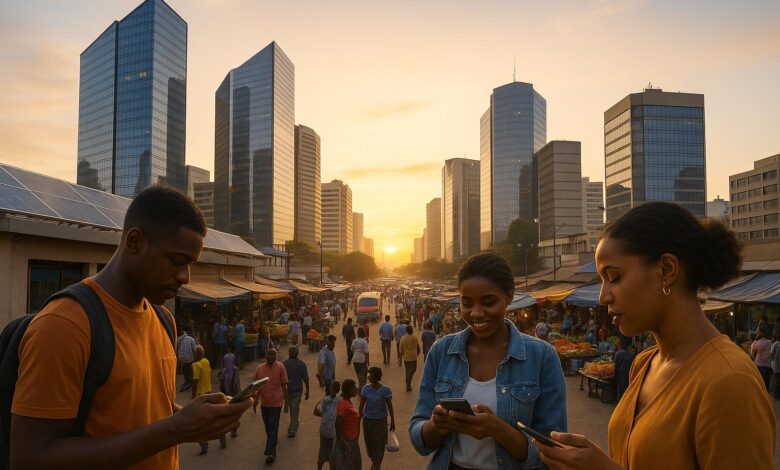
Africa’s startup ecosystem in 2025 is thriving, with $1.35 billion raised in just half the year – a 78% increase from 2024. Leading sectors include fintech and renewable energy, with Nigeria, South Africa, Kenya, and Senegal emerging as key hubs. This list highlights 20 startups reshaping industries like finance, healthcare, e-commerce, and energy, driving economic progress across the continent.
Key Highlights:
- Fintech Dominance: Startups like PalmPay, Flutterwave, and OPay are revolutionizing financial access, processing billions in transactions monthly.
- Healthcare Innovation: Companies like Remedial Health are digitizing pharmaceutical supply chains, improving access to medicines.
- E-commerce Growth: Platforms like Jumia and Omniretail are transforming retail and supply chains for informal markets.
- Renewable Energy: M-Kopa leads with solar and electric mobility solutions, while Zambia’s eShandi focuses on solar energy investments.
- Tech Talent & AI: Andela connects African developers globally, while startups like Pineapple leverage AI for insurance services.
These startups are solving local challenges with scalable solutions, creating jobs, and attracting global investors. Below are the 20 startups to watch in 2025, each driving change in their respective sectors.
25 African Startups to Watch | Bloomberg Next Africa
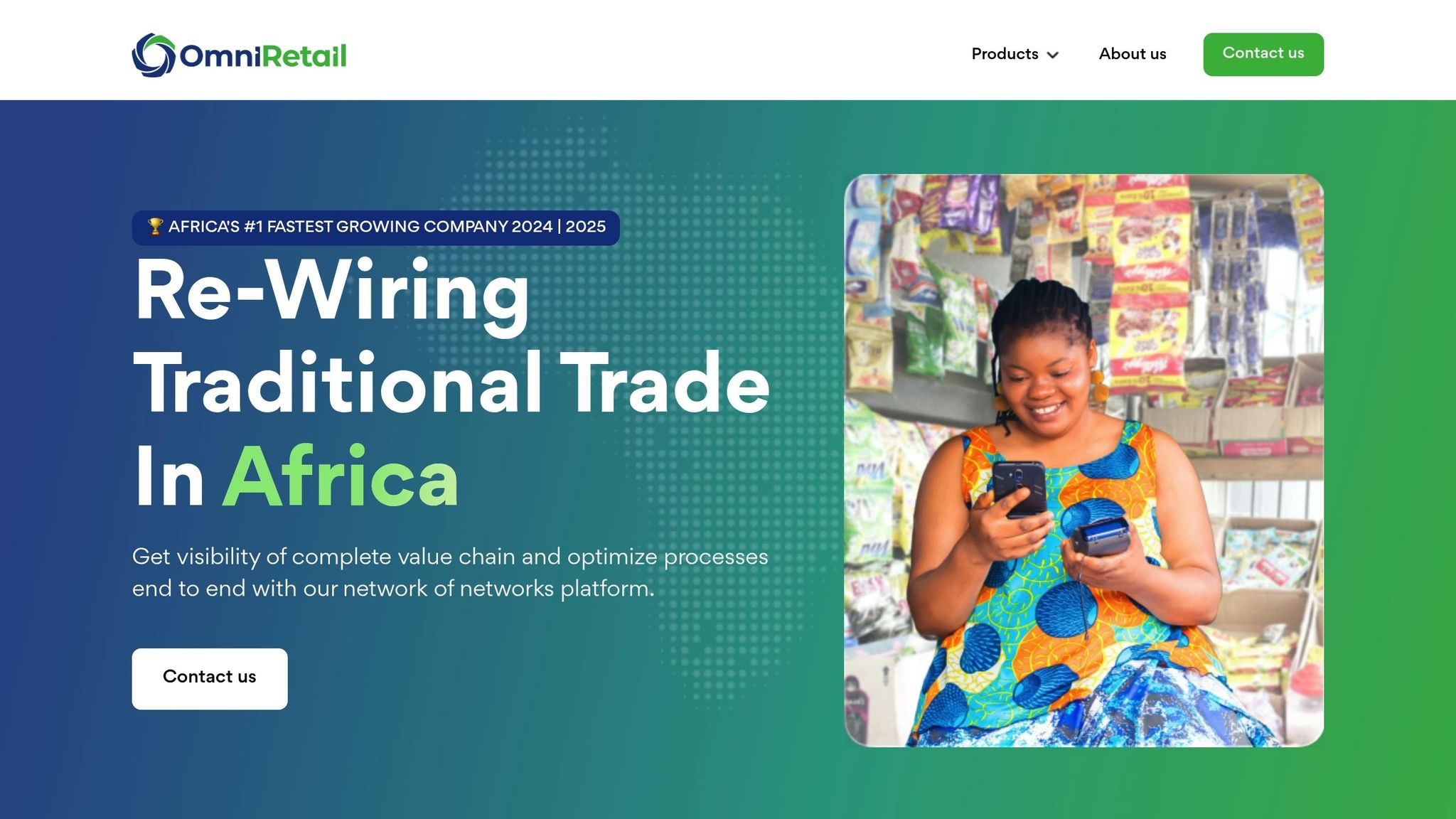
Omniretail has emerged as one of Nigeria’s most impressive B2B commerce success stories, boasting an astonishing 71,818% revenue growth and a 796% compound annual growth rate (CAGR) between 2020 and 2023. The company has positioned itself as a crucial link in connecting manufacturers with Africa’s extensive informal retail sector.
Founded in 2019 by Deepankar Rustagi, Omniretail operates what it describes as a “network of networks”, digitizing the supply chain from manufacturers to small retailers. Today, it supports over 150,000 informal retailers spread across 12 cities in Nigeria, Ghana, and Ivory Coast, connecting them with 145 manufacturers and more than 5,800 distributors.
In 2024 alone, Omniretail processed transactions worth over ₦1.3 trillion (approximately $810 million) and saw a 35% increase in net merchandise volume alongside a 40% growth in revenue compared to the previous year. This impressive performance led the company to achieve EBITDA profitability in 2023 and net profitability by 2024.
“Our profitability is a result of efficiently utilizing the assets we aggregated across the network. Our ‘network of networks’ model has proven both scalable and profitable”, said Deepankar Rustagi.
Omniretail has also leaned into digital innovation. In August 2024, the company introduced three AI-powered solutions that transformed retail operations. The first, a Generative AI assistant on the OmniBiz platform, allows retailers to access real-time product details, discover promotions, and track orders through a simple chat interface. The second is an AI-driven credit scoring system that evaluates transaction data – such as consistency, preferred brands, and volumes – to offer tailored working capital financing. Finally, an AI-powered merchandising solution digitizes product placement campaigns, enabling manufacturers to reward retailers for maintaining product visibility through daily shelf photos uploaded via the OmniBiz mobile app.
Omniretail’s embedded finance arm, Omnipay, has also been a game-changer for small retailers. Its buy-now-pay-later feature disburses ₦19 billion (around $12 million) monthly in inventory credit, with negligible default rates. This success is credited to the company’s strategy of prioritizing scale before introducing credit, avoiding the pitfalls of premature lending seen in earlier models.
In 2025, Omniretail accelerated its growth by securing $20 million in Series A funding, co-led by Norfund and Timon Capital. Additionally, its 2024 acquisition of Traction Apps expanded its capabilities, offering full-stack payment solutions like POS terminals and access to retailer-level sales data. These strategic moves have enhanced Omniretail’s ability to serve its growing market.
“OmniRetail isn’t just fintech or commerce – it’s infrastructure. Embedded finance unlocks growth for Africa’s underserved small businesses”, said Cathrine Conradi, Norfund Investor Director.
Omniretail’s logistics network includes over 1,100 vehicles and distributed warehousing managed by 85 local logistics partners. This extensive infrastructure allows the company to reach even remote areas, a critical advantage given that informal retail accounts for roughly 90% of consumer goods transactions in Africa.
In recognition of its achievements, Omniretail was named Startup of the Year at the TECH ECOSYSTEM AWARDS by AOT Lagos, solidifying its reputation as one of Africa’s most promising tech companies as it heads into 2025.

PalmPay has emerged as one of Africa’s fastest-growing financial services companies, boasting an incredible 583.6% compound annual growth rate (CAGR) between 2020 and 2023. This growth has cemented its position as a leader in digital payments.
In the first quarter of 2025 alone, PalmPay processed over 15 million daily transactions, a notable increase from the 10 million daily transactions recorded in 2024. With a user base exceeding 35 million registered users, each completing an average of 50 transactions per month, the platform has become a financial hub for millions. Operating as a “super app”, PalmPay integrates various financial services, including banking, investments, insurance, and payments, through strategic collaborations. As Managing Director Chika Nwosu explains:
“We have effectively built a super app that integrates banking, investment, insurance, and payments. Think of it like a one-stop financial marketplace that is fully compliant through layered partnerships.”
PalmPay’s influence on financial inclusion is significant, with 25% of its users reporting that the platform provided them with their first-ever financial account. Its extensive offline presence, consisting of over 1 million merchants and agents, serves more than 13 million customers each month, ensuring widespread access to financial services.
The company’s wealth management offerings have also gained traction. In the first quarter of 2025, PalmPay disbursed ₦4 billion (approximately $2.5 million) in interest to users of its PalmPay Wealth Product. With flexible savings interest rates of up to 20% annually and Smart Earn rates reaching 22%, this product now attracts 9 million active monthly users.
In March 2025, PalmPay introduced its debit card in collaboration with Verve. Designed to appeal to its massive user base, the card offers savings rewards, merchant discounts, and zero maintenance fees, with nationwide delivery. The company plans to distribute over 5 million cards through its agent network by the end of 2025. As Nwosu highlights:
“This launch is another step forward in our mission to deliver accessible, reliable and rewarding financial services. With the PalmPay Debit Card, we are expanding our ecosystem and enabling our users to pay and earn rewards at even more touch points, including across offline and online commerce. And for merchants, this opens up new opportunities to reach millions of Nigerian digital consumers and collaborate with us to build reward-driven experiences that boost loyalty and sales.”
PalmPay’s ambitions stretch beyond Nigeria. By June 2025, it introduced cross-border payment solutions for merchants, facilitating seamless transactions across Nigeria, Kenya, and Tanzania, with monthly volumes reaching “hundreds of millions of dollars”. The company has already expanded into Tanzania and Bangladesh, with plans to enter new markets like Uganda, South Africa, and Côte d’Ivoire.
Financially, PalmPay has been thriving. The company generated $64 million in revenue in 2023, and its revenue has more than doubled over the past year. It is currently in discussions to raise between $50–$100 million as it edges closer to profitability. Nwosu elaborates on the company’s vision:
“Our growth is propelled by a clear vision: to empower businesses and individuals with frictionless, reliable financial tools. We’re deepening partnerships across the fintech ecosystem to enhance payment infrastructure and foster a more connected African economy. As we scale, we remain focused on accessibility, innovation, and regional collaboration to drive the growth of digital economies in emerging markets.”
With its bold expansion plans and diverse financial services, PalmPay continues to set a high standard across the African fintech landscape as it ventures into new markets.
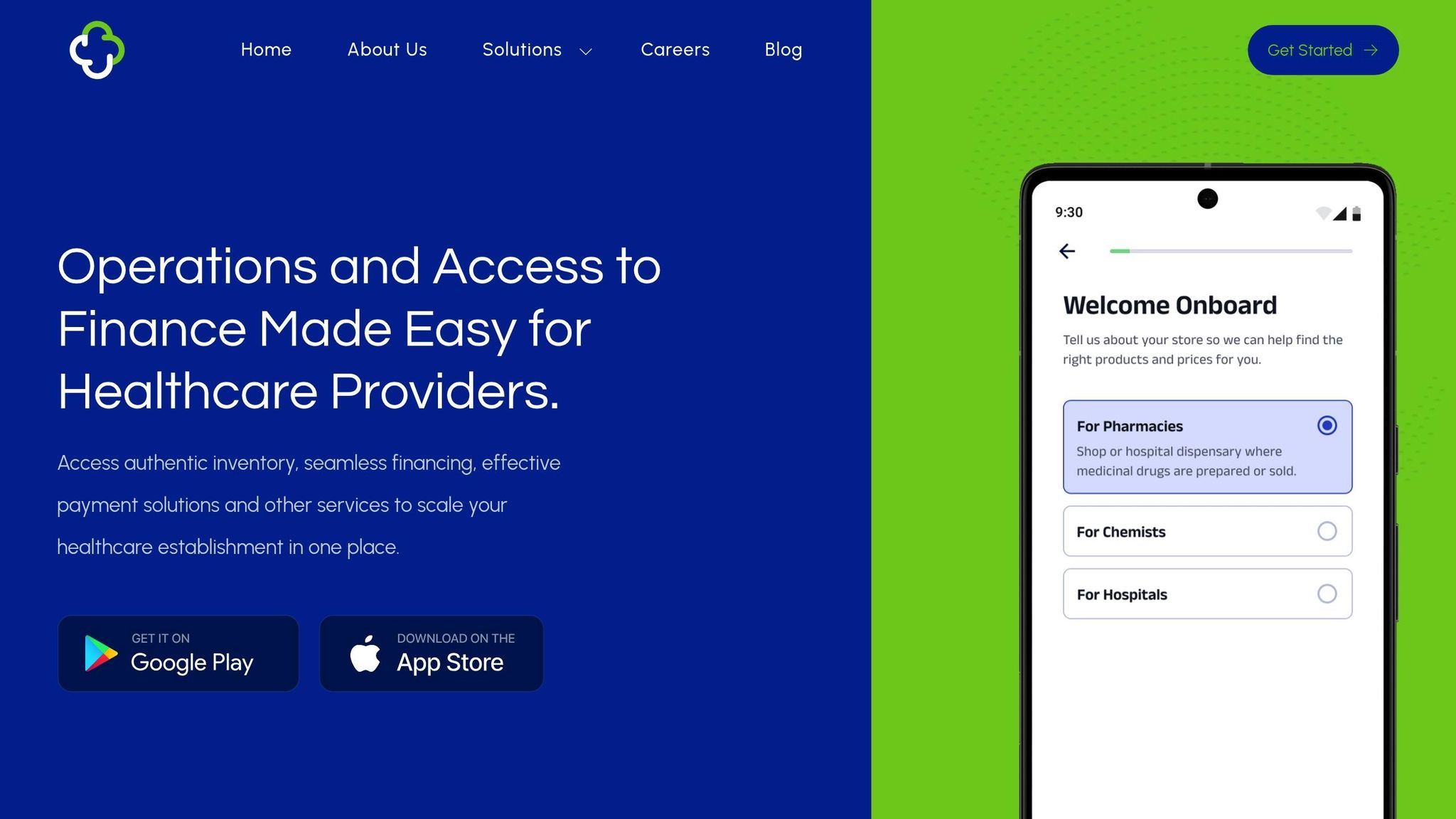
Remedial Health has earned its spot as Africa’s fastest-growing health tech company in 2025, securing third place in The Financial Times “Africa’s Fastest Growing Companies” list. This ranking is based on verified revenue data spanning 2020 to 2023.
Based in Lagos, this startup is revolutionizing healthcare in Nigeria by building a digital infrastructure that connects over 14,000 healthcare providers with critical pharmaceutical supplies and services. Operating across all 36 states and the Federal Capital Territory, it collaborates with over 300 manufacturing and distribution partners, including major players like GSK, Pfizer, and AstraZeneca [38, 39, 40].
Since its inception in 2020, Remedial Health has financed $40 million worth of medicines, addressing gaps in a market where 85% of retail and 90% of wholesale pharmaceutical transactions occur outside traditional pharmacy channels [38, 42].
The platform simplifies daily operations for healthcare providers by offering tools for real-time inventory management, accounting, financial reporting, and market insights. With a network of distribution hubs and last-mile delivery services, it ensures orders are delivered within 24 hours, significantly improving supply chain efficiency.
In 2025, the company raised $12 million in Series A funding, adding to the $4.4 million it secured during its seed round in September 2022. These funds are fueling its growth, particularly in expanding access to pharmacies and hospitals in rural areas [40, 42].
CEO Samuel Okwuada shared:
“This recognition is a reflection of the tremendous impact our technology is having on healthcare delivery in Africa, starting in Nigeria. We are building the infrastructure for a more efficient, data-driven and profitable healthcare ecosystem, and we are just getting started. Our commitment is to deliver innovative solutions that empower the frontline providers and strengthen healthcare businesses at every level.” [38, 39]
Looking ahead, Remedial Health plans to expand beyond Nigeria, starting operations in Francophone countries like Cameroon in 2025. It also aims to enhance its capacity by extending its Abuja hub and building a new warehouse in Asaba to meet growing regional demand.
As part of Africa’s broader digital transformation, Remedial Health demonstrates how technology is reshaping traditional industries. Its digitized supply chain, which integrates inventory management, data-driven insights, and flexible financing, empowers healthcare providers to operate more efficiently while improving access to affordable, authentic medicines [38, 41].
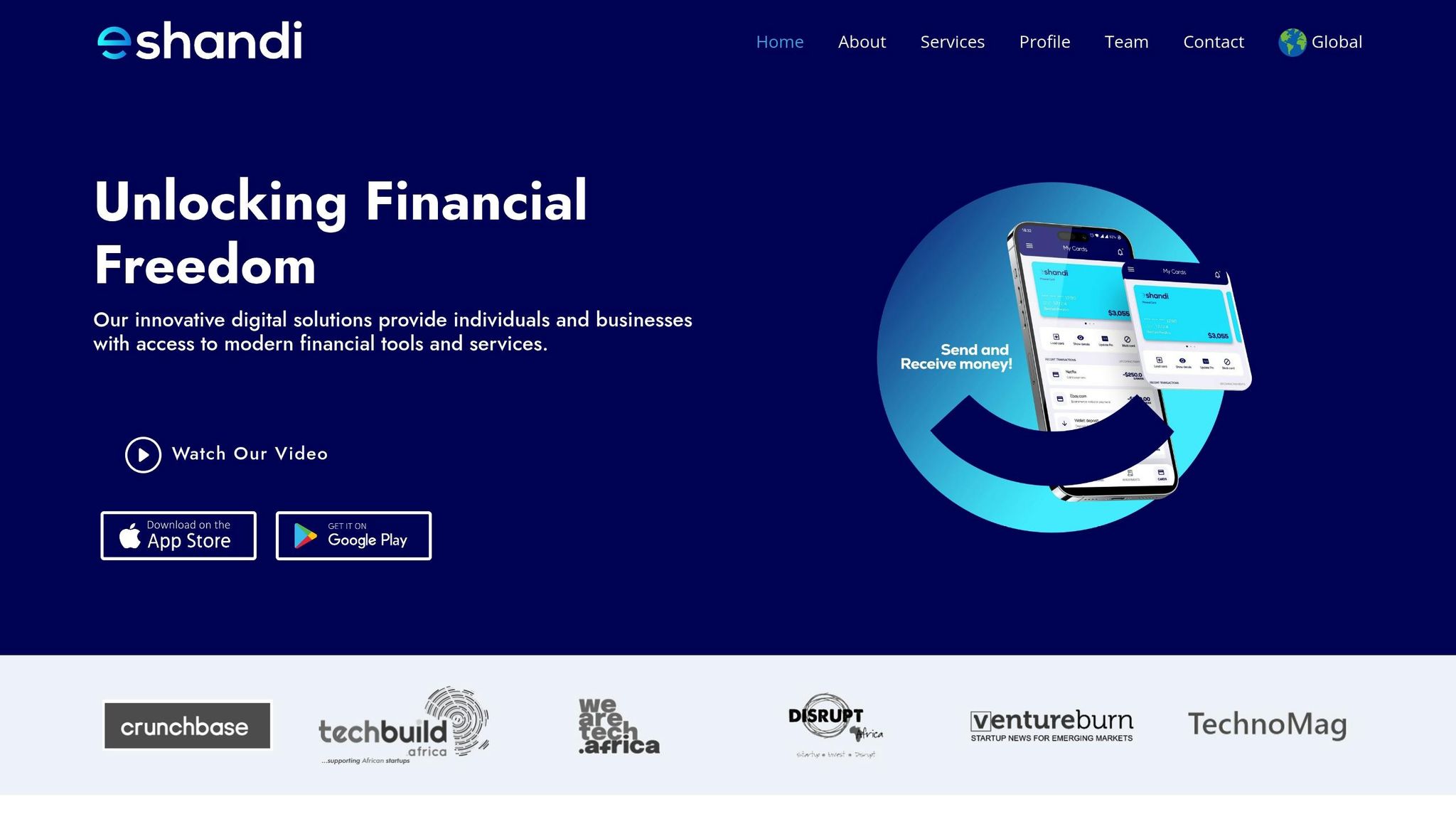
Zambian fintech eShandi secured the fourth spot on The Financial Times‘ “Africa’s Fastest Growing Companies” list in 2025, boasting an impressive 276.4% CAGR. This achievement has not only highlighted Zambia as a fintech hub but also marked a significant milestone in eShandi’s journey of driving innovation in Africa’s financial sector.
Established in 2019 under the name PremierCredit, eShandi began as a microfinance institution aimed at providing financial services to unbanked communities through technology. Over time, it evolved into a full-fledged fintech platform, offering a wide range of digital financial services designed to promote financial inclusion and empower underbanked individuals and businesses.
The company’s revenue skyrocketed from $100,000 in 2020 to $12.2 million by 2023. This rapid growth allowed eShandi to serve over one million individuals and small and medium enterprises (SMEs) across four countries, disbursing more than $10 million in working capital along the way.
A major driver of eShandi’s success is its AI-powered credit scoring system. By eliminating traditional barriers, the platform provides instant, collateral-free loans, along with seamless payment solutions and comprehensive banking services.
Co-founder Chilufya Mutale-Mwila shared the company’s mission:
“We realised that many SMEs and individuals, particularly women, had limited access to capital from traditional financial institutions, stifling their growth potential and financial security. Our AI-driven platform enables us to assess credit applications and disburse loans with unmatched speed and accuracy, eliminating the need for traditional paperwork and checks.”
Fueled by its growth, eShandi expanded beyond Zambia into Zimbabwe, Kenya, and South Africa. By partnering with local agents, the company extended banking services to underserved areas, enabling cash deposits, withdrawals, and other essential transactions. This expansion addresses a critical challenge in Africa, where over 350 million adults still rely solely on cash, lacking access to formal financial services.
Looking ahead, eShandi has ambitious plans to enter new markets and introduce cross-border solutions, aiming to establish itself as a pan-African challenger bank. To support these efforts, the company secured $12 million in funding from prominent international investors.
Mutale-Mwila emphasized the company’s vision:
“The FT’s ranking serves as validation that impact and profitability can go hand-in-hand, particularly in emerging markets. We have ambitious plans to scale into more markets and roll out cross-border solutions – eventually becoming a pan-African challenger bank disrupting the status quo across the continent. For us, growth is not just about numbers – it’s about achieving even greater impact.”
With Zambia’s economy projected to grow by at least 6% in 2025, eShandi is well-positioned to meet the increasing demand for digital financial services while addressing the $330 billion financing gap across Africa.
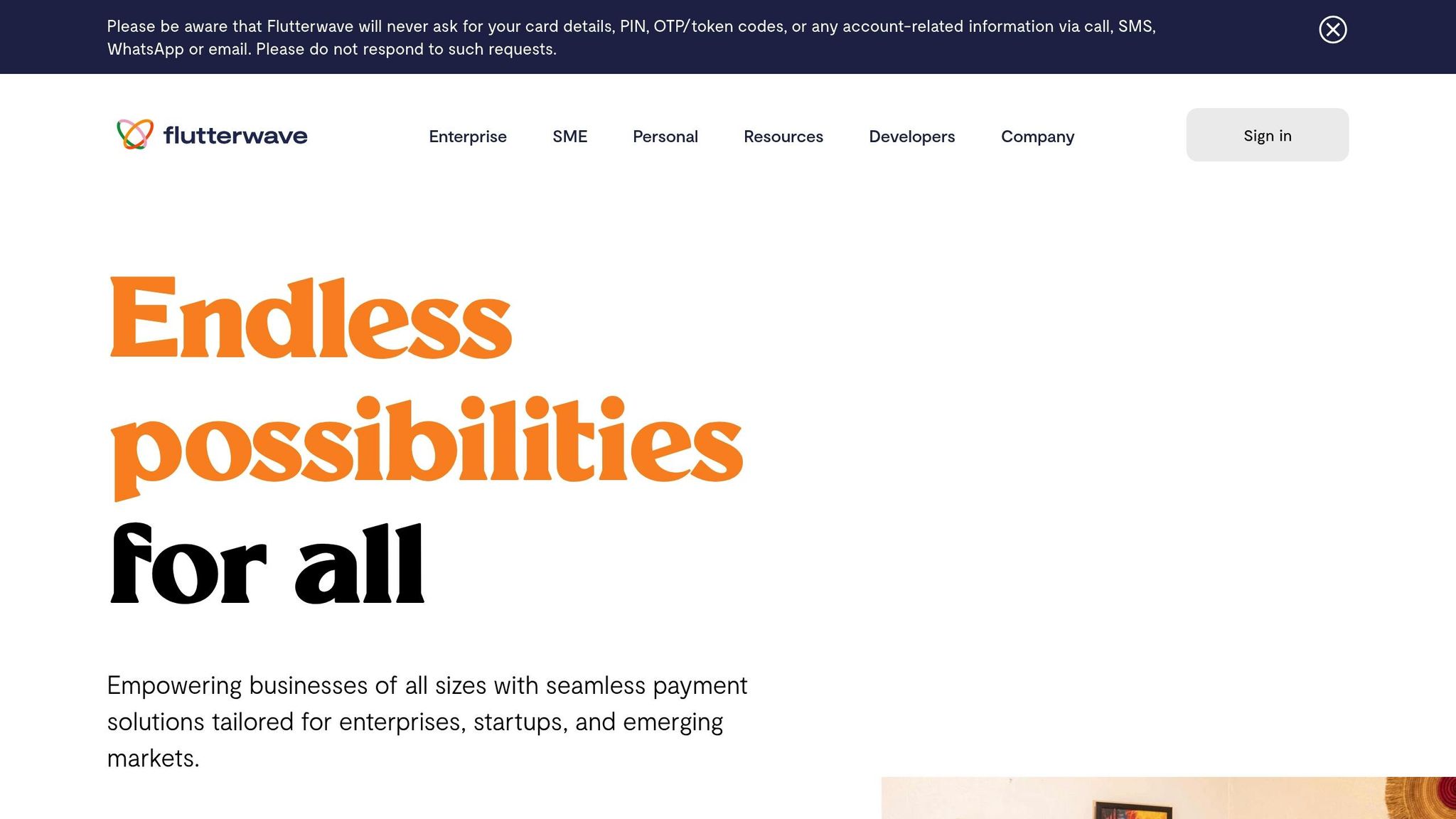
Flutterwave, a powerhouse in Nigeria’s fintech scene, continues to solidify its reputation as Africa’s go-to payment infrastructure provider. Its achievements in 2025 have earned it a spot on the TIME100 Most Influential Companies List of 2025.
In 2024 alone, Flutterwave processed an astounding $31 billion in transactions, supported by over 1 million business customers. The platform handles more than 500,000 payments daily and offers 15+ payment methods, showcasing the trust it has earned from its users.
The company’s growth in 2025 has been nothing short of ambitious. In June, Flutterwave secured a payment service provider license in Cameroon, extending its reach to over 30 African countries. A month later, it obtained a Payment Institution license in Senegal, granted by the Central Bank of West African States (BCEAO), enabling it to provide comprehensive solutions to Senegalese businesses. These developments reflect Flutterwave’s commitment to expanding its influence across the continent.
“Cameroon is central to the future of Africa’s digital economy, and we’re proud to play a part in unlocking its potential”, said Olugbenga “GB” Agboola, Founder and CEO of Flutterwave.
One of Flutterwave’s standout products, the Send App, has gained traction internationally. Nearly 98% of its transactions are completed within five minutes. The app has made significant inroads in the US, UK, and EU markets, where Flutterwave now holds 34 licenses in the United States alone. This expansion allowed nearly 50% of its customers to access payments in new markets during 2024.
Strategic partnerships further fuel Flutterwave’s growth. For example, in June 2025, Kenyan startup Chpter partnered with Flutterwave to expand into 11 additional African countries, enabling businesses to accept payments via mobile money, cards, and bank transfers across West, Central, and East Africa.
Flutterwave’s efforts have not gone unnoticed. It was recognized for excellence in cross-border payments at the 2025 Africa Tech Summit in Nairobi and awarded “Fintech of the Year” at the 2024 African Banker Awards. Operating in over 35 countries and supporting 150+ currencies, the company aims to achieve profitability by the end of 2025, driven by its robust growth and market expansion strategies.
CEO Olugbenga Agboola remains focused on the bigger picture, emphasizing, “We’re here for the long game”. With a strong foundation and forward-thinking leadership, Flutterwave is poised to lead Africa’s digital payment transformation.
6. Jumia (Nigeria)
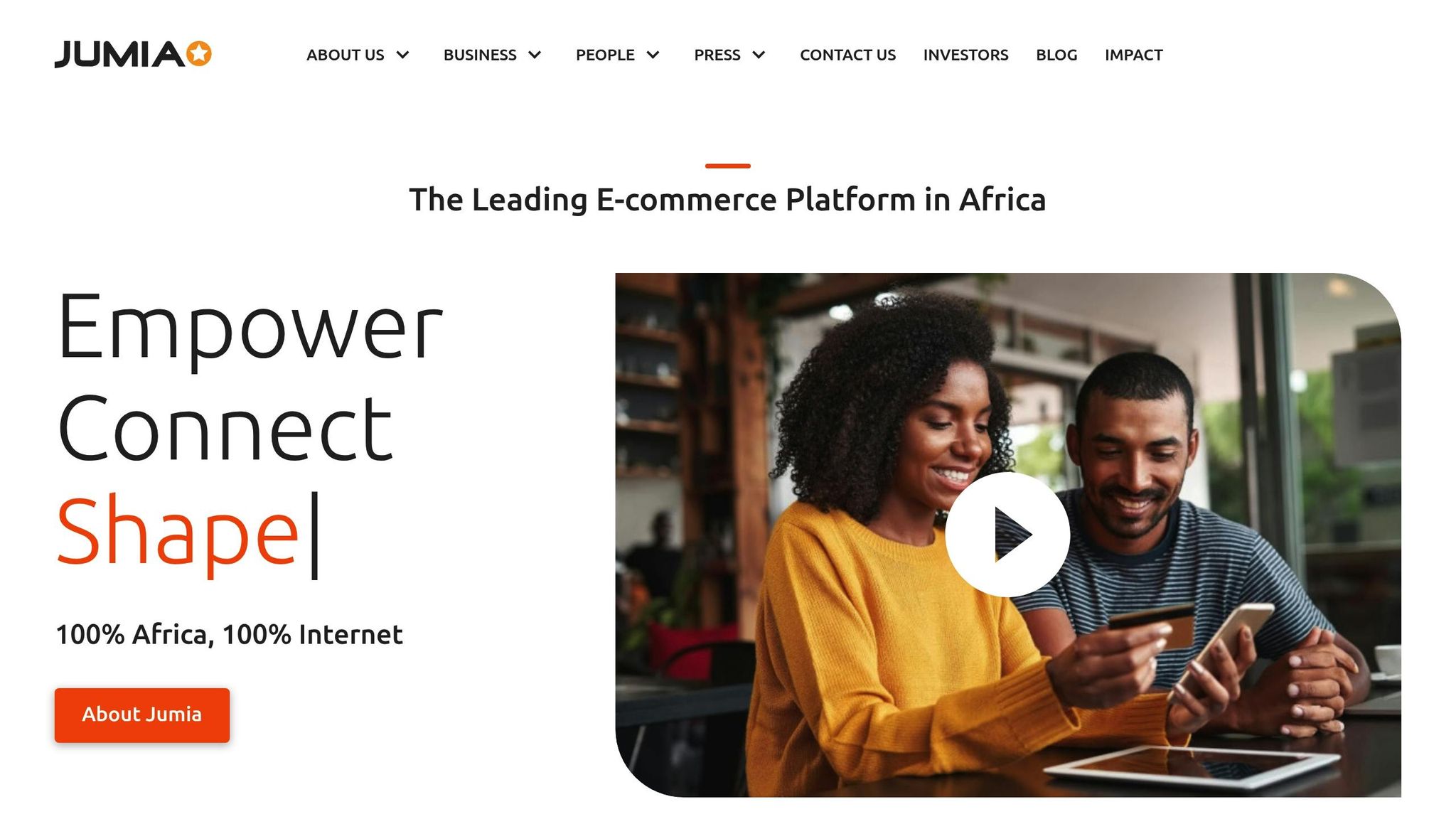
Jumia stands out as a leading pan-African e-commerce platform, operating in nine African countries and meeting the diverse needs of consumers across the continent. Its growth in 2025 highlights its adaptability and strategic focus in Africa’s expanding digital economy.
The numbers paint a clear picture of progress. In Q1 2025, Jumia reported a 21% year-over-year increase in orders and a 15% rise in active customers. Nigeria, in particular, saw a 22% growth in orders and a 20% increase in gross merchandise value (GMV). These achievements align with Africa’s projected $40.49 billion e-commerce revenue for 2025. This strong performance has set the stage for Jumia’s strategic priorities this year.
CEO Francis Dufay shared the company’s vision for 2025:
“As we look ahead to 2025, the company is optimistic about its future. The business is stronger and more efficient than it was just two years ago, and we believe we have a good opportunity ahead of us. Our priorities for the year are to build on this momentum by driving top-line growth and improving operational efficiencies. We plan to double down on expansion outside the main urban centers, expand our product assortment with competitive pricing, and strengthen relationships with international sellers. To improve our path to profitability, we will continue to enforce cost discipline and enhance operational and marketing efficiency.”
Expanding Logistics Capabilities
To handle increasing order volumes, Jumia introduced Jumia Delivery in Nigeria in May. With one of the largest delivery fleets in the country, the service now reaches hundreds of cities. Plans are already in motion to expand this service to Kenya, Ghana, and Senegal.
“Africa’s growing digital economy demands robust and efficient delivery services, and we are excited to introduce Jumia Delivery as a reliable solution to improve last-mile logistics. The introduction of Jumia Delivery in Nigeria, following our success in Côte d’Ivoire, is a major step forward in addressing logistics challenges and meeting the evolving needs of both individuals and businesses”, Dufay explained.
Strengthening Marketplace Efficiency
In July, Jumia partnered with Mirakl Ads to upgrade its retail media program. By utilizing AI-driven sponsored product ads, automated campaign management, and enhanced analytics, the platform has improved ad targeting and marketplace efficiency.
Additionally, Jumia expanded its “Buy Now, Pay Later” (BNPL) services in Algeria through a partnership with Diar Dzair. This builds on its existing BNPL offerings in Nigeria, which include partnerships with Easybuy and CredPal.
Leveraging Market Events and Partnerships
Jumia’s Tech Week 2025, held in March, showcased collaborations with popular brands like Xiaomi, Oraimo, and Tecno. The event offered discounts on products ranging from smartphones to home appliances, tapping into Nigeria’s growing base of over 142 million active internet subscribers as of January 2025.
“We’re excited to present Jumia Tech Week 2025, a platform to enable Nigerians to have access to high-quality devices. With the rapid growth in digital adoption across the country, this campaign is designed to put the latest innovations within reach, helping customers stay connected, productive, and entertained”, said Sunil Natraj, CEO of Jumia Nigeria.
Embracing AI for the Future
Jumia has also incorporated artificial intelligence to gain a competitive edge. AI tools help the company analyze consumer behavior, predict demand, and provide personalized shopping experiences while optimizing supply chains.
“Artificial intelligence is revolutionizing e-commerce in Africa by enhancing personalized shopping experiences, optimizing supply chains, and improving customer service through chatbots and virtual assistants”, Dufay noted.
With over half of Nigeria’s population living in rural areas and online retail projected to account for 23% of all purchases by 2027, Jumia’s expansion beyond urban centers positions it for long-term success. Its integrated ecosystem – including a robust marketplace, JumiaPay, and an extensive logistics network – addresses the unique challenges of e-commerce in Africa. This ongoing evolution cements Jumia’s role as a driving force in Africa’s digital commerce growth.
7. OPay (Nigeria)
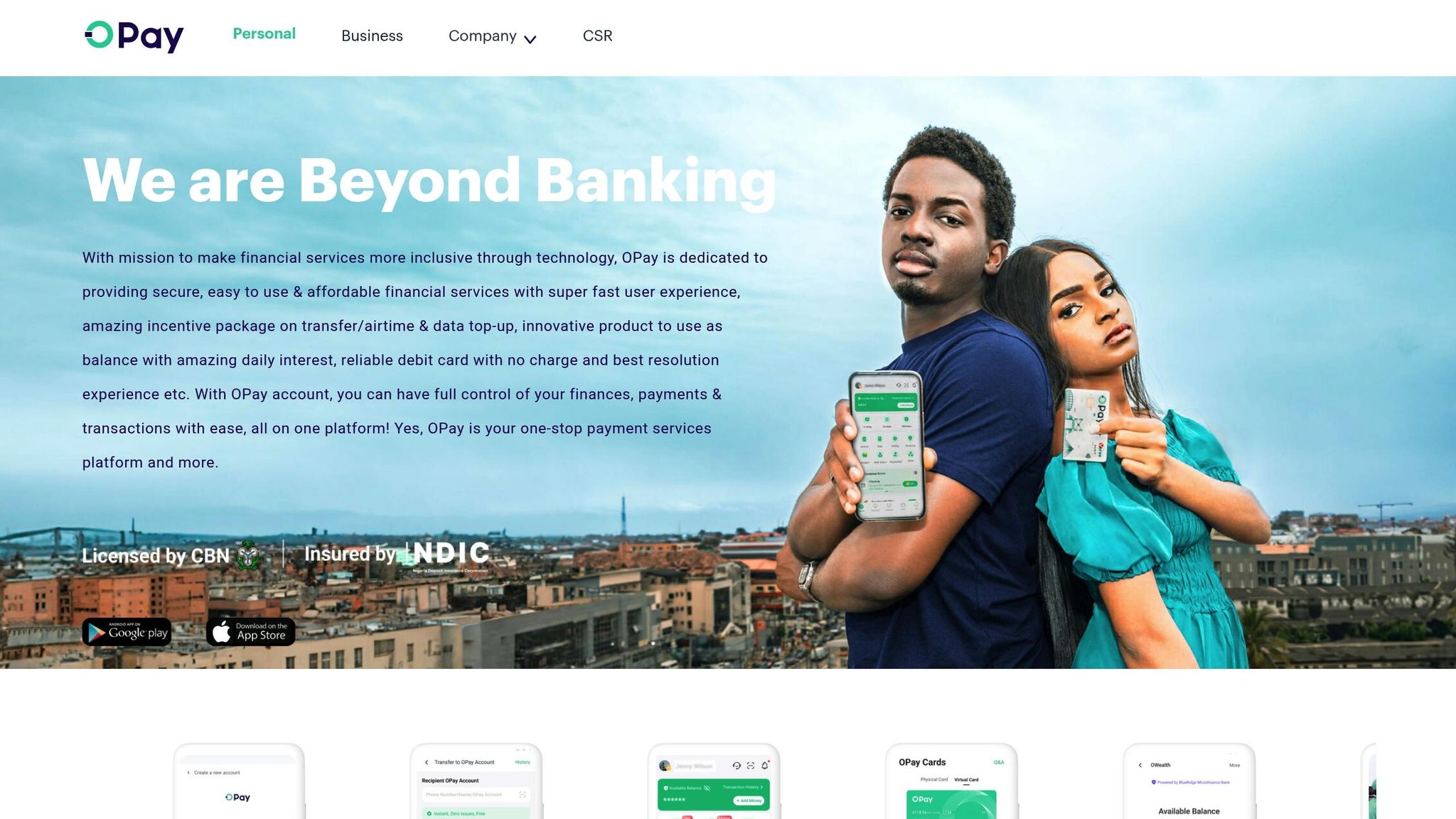
OPay has cemented its place as one of Nigeria’s leading fintech companies, achieving a valuation of $2.75 billion in April 2025. This milestone showcases its success in promoting financial inclusion while navigating the complexities of Nigeria’s digital payments landscape. Today, OPay serves millions through a variety of financial services, making a significant impact on the country’s economy.
Currently, OPay supports over 50 million users and 1 million merchants, processing more than $12 billion in transactions every month.
Making Financial Services Accessible
OPay’s core mission revolves around providing financial services to underserved communities in Nigeria. Its offerings include money transfers, bill payments, airtime purchases, card services, and merchant payment solutions. These efforts have created approximately 400,000 jobs across the region.
“OPay’s mission is to make financial services more inclusive through technology”, explained Yahui Zhou, Chairman of OPay.
In recognition of its contributions, OPay received the IFIC Award for Financial Inclusion Innovation from Nigeria’s Central Bank in December 2024. The award acknowledged its adherence to regulations, technological advancements, and its role in advancing financial inclusion.
“This recognition by the CBN highlights OPay’s dedication to providing innovative, compliant, and inclusive financial solutions”, said Dauda Gotring, CEO of OPay.
Growth Amid Market Challenges
OPay’s rapid growth was evident during Nigeria’s 2023 currency redesign crisis, which led to widespread cash shortages. As Nigerians sought dependable digital payment options, OPay saw its customer base quadruple. This period highlighted the company’s resilience and ability to adapt to market disruptions.
The Super App Approach
The increased adoption of digital services has fueled OPay’s “super app” strategy. By combining mobile payments, ride-hailing, food delivery, and investment services into one platform, OPay has created an ecosystem that drives engagement and generates multiple revenue streams. The company predicts its revenue will grow at an annualized rate of 35% between 2023 and 2030.
“Our mission goes beyond profitability. We aim to foster community-led financial empowerment”, emphasized OPay’s CEO.
Expanding Across the Continent
While Nigeria remains OPay’s home base, the company has extended its operations to Egypt and Pakistan, with plans to expand further into Kenya and Ghana. This regional growth aligns with Africa’s ongoing digital transformation and reflects the continent’s broader fintech boom.
OPay’s trajectory also mirrors a larger trend in African fintech. As of March 2025, 8 of Africa’s 9 unicorns were fintech companies, underscoring the sector’s importance to the continent’s economic growth. Despite global market uncertainties, OPay has consistently attracted strong investor confidence.
With over $570 million in funding and a workforce of 1,542 employees, OPay is building the infrastructure needed to meet Africa’s demand for accessible financial services and to continue driving digital innovation.
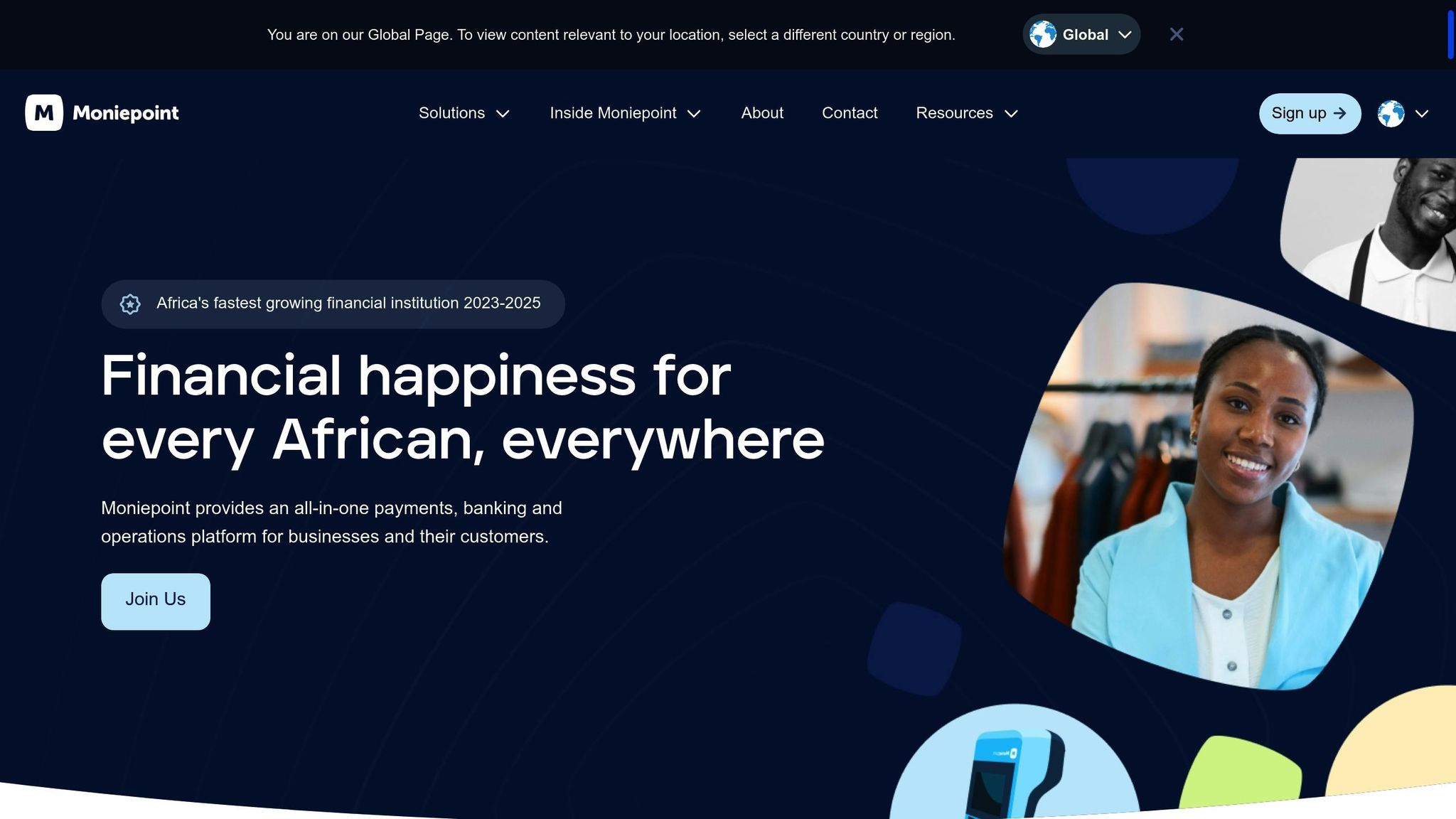
Moniepoint has firmly established itself as a leader in Nigeria’s fintech industry, handling over 1 billion transactions every month and managing an impressive $22 billion in monthly payment volume. Serving ten million businesses and individuals across the country, Moniepoint’s influence and operational scale are unmatched. This success has earned the company significant recognition and accolades within the industry.
Record-Breaking Growth and Recognition
Moniepoint’s rapid rise to prominence led to its inclusion in TIME’s list of the World’s Most Influential Companies of 2025. This acknowledgment highlights the company’s consistent growth and innovation, which have solidified its standing in the fintech space.
“This recognition by TIME validates the work we do every day to create financial happiness for millions of people and businesses in Africa. From enabling over 10 million businesses to accept payments, access working capital, and run their operations digitally, to supporting everyday Africans – we are proud of the role we play in powering dreams while transforming lives and livelihoods”, said Tosin Eniolorunda, CEO and Co-Founder, Moniepoint Inc.
The company’s achievements are underscored by a staggering 2,000% growth in its personal finance customer base over the past year, with revenue reaching $264.51 million in 2023. Moniepoint’s innovative contributions have also earned it a spot on CB Insights‘ Fintech 100 list three times.
Transforming Traditional Markets
Moniepoint’s reach extends beyond digital payments, impacting traditional marketplaces as well. In Onitsha, the largest market in West Africa, Moniepoint processes $2 million in transactions daily. Remarkably, two-thirds of all in-person payments in the market are made through Moniepoint’s POS terminals. This integration into informal economies demonstrates the company’s ability to bridge the gap between traditional commerce and digital financial services, fueling its ambitions for broader influence.
Expanding Beyond Nigeria
In April 2025, Moniepoint launched MonieWorld, a remittance and digital financial services platform targeting the African diaspora in the UK. This move addresses the growing demand for reliable cross-border payment solutions, making it easier for users to send money to Nigeria. The company’s international growth strategy is further evidenced by its acquisition of a 78% stake in Sumac Microfinance Bank in Kenya. Additionally, Moniepoint is developing Moniebook, a business management and bookkeeping platform designed to expand its offerings beyond payments.
Infrastructure Dominance
Moniepoint’s POS terminals form the backbone of Nigeria’s digital transaction ecosystem, playing a critical role in supporting the country’s move toward digital payments. This extensive infrastructure has made the company indispensable to small and medium enterprises, particularly in informal sectors.
“We are very excited about 2025. We continue to innovate and develop new products to support financial inclusion and drive financial happiness – both in Africa and for consumers in the global diaspora”, stated Tosin Eniolorunda, Group CEO of Moniepoint Inc.
After achieving unicorn status in October 2024 with a $110 million Series C funding round, Moniepoint is leveraging its position to expand financial inclusion and strengthen Africa’s digital finance infrastructure.
9. TymeBank (South Africa)
TymeBank has cemented its position as South Africa’s third-largest bank, boasting an impressive customer base of 11 million and adding 6,500 new users daily. What sets this digital bank apart is its ability to achieve profitability in less than five years – an accomplishment that makes it the first digital bank in Africa to reach this milestone. This rapid success highlights TymeBank’s forward-thinking strategies and its growing influence in South Africa’s financial sector.
Record-Breaking Growth and Unicorn Status
In December 2024, Tyme Group, TymeBank’s parent company, joined the exclusive ranks of unicorns after securing $250 million in Series D funding, led by Nubank, bringing its valuation to $1.5 billion. This puts TymeBank among the elite few – less than 5% of neobanks globally – that have reached profitability. Remarkably, it achieved this in a shorter time frame than global players like Nubank (8 years) and Monzo (7 years).
The numbers speak volumes about its growth. Total deposits have surged to nearly $385 million (R7 billion), while the bank consistently attracts around 150,000 new customers each month. Its lending portfolio has expanded by 30% year-on-year, with over $600 million (R12 billion) disbursed to more than 80,000 small businesses.
“Reaching 10 million customers is a testament to our team’s dedication to providing equitable banking that meets the evolving financial needs of South Africans”, said Karl Westvig, CEO of TymeBank.
Innovative Hybrid Banking Model
TymeBank’s success largely rests on its hybrid banking model, which blends digital convenience with in-person services. Through partnerships with major retailers like Pick n Pay, Boxer, and TFG, the bank operates over 1,000 kiosks and 15,000 retail points across South Africa. This setup allows customers to open a bank account in less than three minutes at grocery stores. This efficient system keeps customer acquisition costs at just $4 per user, while transaction costs are 30–50% lower than those of traditional banks.
“You can walk into a grocery store in South Africa and open a bank account with us in under three minutes”, said Rachel Freeman, Chief Growth Officer.
This model reflects Africa’s growing emphasis on digital inclusion while maintaining the human touch that many customers still value.
Strategic Expansion and Innovation
TymeBank is not just growing; it’s evolving. In May 2025, the bank entered a retail credit joint venture with Sanlam Life and Sanlam Personal Loans to offer unsecured personal loans bundled with credit life insurance. Additionally, its acquisition of fintech firm Retail Capital allowed it to launch TymePOS, a mobile point-of-sale solution tailored for small and medium-sized enterprises, further strengthening its business banking services.
The bank is also leveraging advanced data analytics and artificial intelligence to refine customer experiences and expand its product offerings. AI plays a pivotal role in assessing creditworthiness and enhancing consumer lending capabilities.
Market Recognition and Customer Satisfaction
TymeBank’s rapid rise has not gone unnoticed. It was named one of the 100 most influential companies globally and ranked among South Africa’s top 50 brands. The bank also enjoys one of the highest net promoter scores in the industry, ranking second for “value for money”, “transparent rates”, and “fairness” among retail customers.
“This funding will propel our growth strategy, enabling us to realise our stated goal of being a top three retail bank in South Africa in the next three years. Additionally, the enhanced credibility and market visibility that comes with the affiliation with Nubank, along with the large established networks of global investors, including GIC, Berkshire Hathaway and others, helps pave the group’s path towards a potential listing by 2028”, said Karl Westvig, CEO of TymeBank.
10. Moove (Nigeria/South Africa)
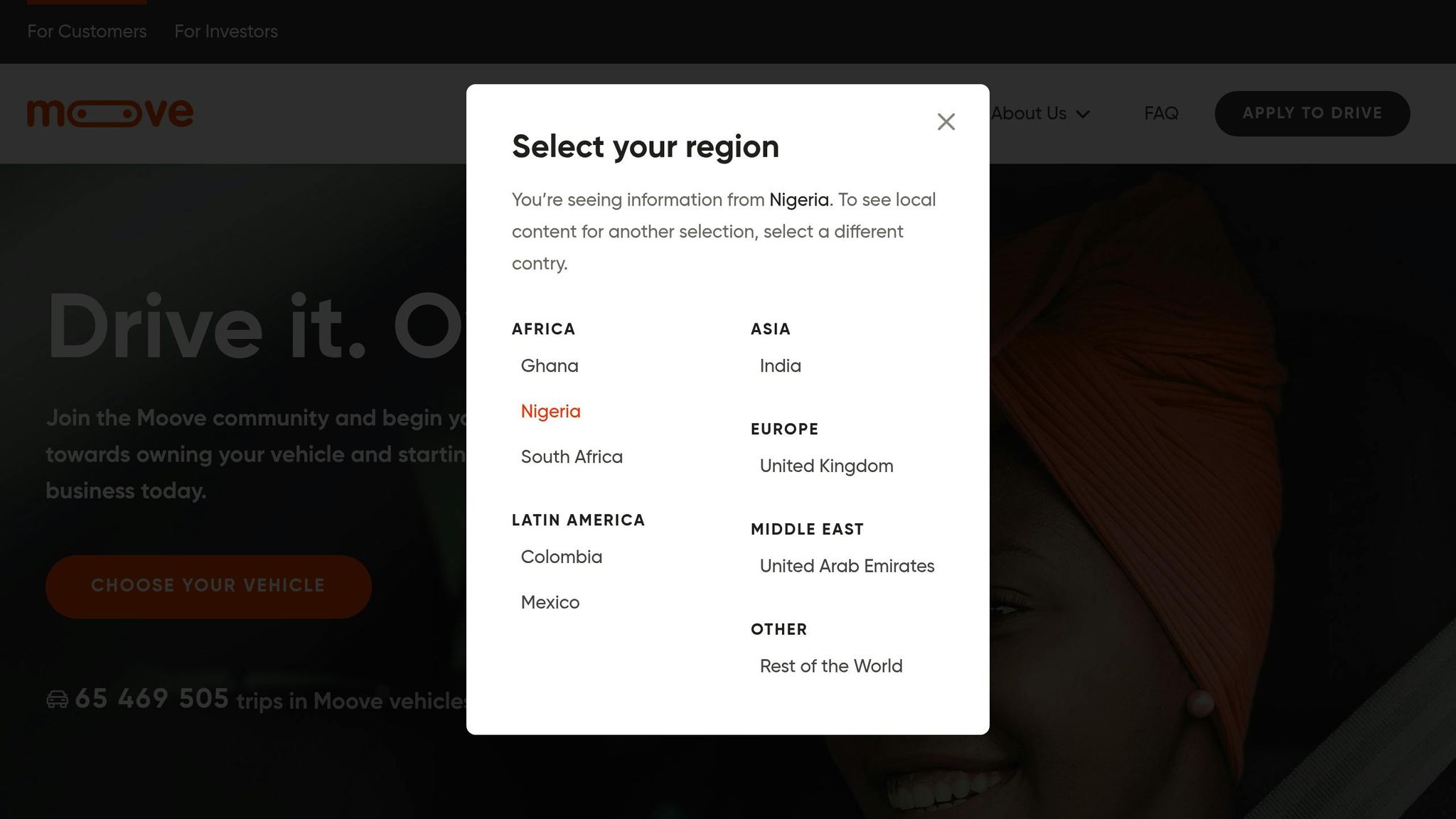
Moove, established in Africa, is transforming transportation on a global scale. The company’s innovative financing model tackles the challenges of vehicle ownership for gig economy workers by offering flexible financing and management solutions. This approach has fueled impressive revenue growth and global expansion.
Rapid Revenue Growth and Global Reach
Over the past year, Moove’s revenue jumped 45%, climbing from $275 million to nearly $400 million. Its annualized revenue also grew significantly, rising from $115 million to $360 million. After acquiring Kovi in January 2025, Moove expanded its operations to 19 cities across six continents. With a fleet of 36,000 vehicles, the company now supports over 50,000 mobility entrepreneurs, who have collectively driven more than 186 million miles and completed over 30 million trips.
Strategic Acquisitions and Advanced Technology
In January 2025, Moove acquired Kovi, a mobility company based in São Paulo, Brazil. This acquisition not only expanded Moove’s global presence but also brought advanced technology into its portfolio. Kovi’s proprietary IoT software and driver behavior models have strengthened Moove’s focus on safety and efficiency.
“This transaction reinforces our dominant position in global mobility and our commitment to the Brazilian economy. Kovi’s proprietary IoT software and advanced driver behaviour models complement our existing capabilities, supporting our focus on safety, efficiency, and innovation in AI mobility.”
– Ladi Delano, co-founder and co-CEO of Moove
In addition, Moove partnered with Waymo, Alphabet’s autonomous driving subsidiary, in 2024. This collaboration allows Moove to manage fleet operations for Waymo’s robotaxi services in Phoenix and Miami, marking its transition from vehicle financing to advanced mobility infrastructure.
Financial Discipline and Debt Repayment
Moove has demonstrated strong financial management. In 2025 alone, the company repaid around $100 million in loans, fully clearing its initial debt facilities.
“Moove has built strong relationships with some of the world’s leading lenders. We have also fully repaid our first-ever debt facilities, which signals our maturity and marks a key milestone that demonstrates the strength of our platform as we enter the next phase of global autonomous-vehicle infrastructure deployment.”
– Ladi Delano
To date, Moove has secured approximately $421.5 million in combined debt and equity funding, providing a solid base for its ongoing expansion.
Commitment to Electric Vehicles and Sustainability
Moove is actively embracing the shift to electric vehicles (EVs). The company plans to introduce over 20,000 EVs to Uber’s platform in India, aligning with global efforts to reduce fuel costs and environmental impact. In markets like the U.K. and UAE, Moove is driving full electrification, while in countries such as Nigeria, it is facilitating a gradual transition from internal combustion engines to compressed natural gas (CNG) and eventually to EVs.
“We want to be at the forefront of electrification in the U.K. and UAE by putting more EVs on the road. But in countries like Nigeria, we hope to be at the forefront of the transition from ICE (internal combustion) engines to compressed natural gas (CNG) vehicles and then from CNG to EVs.”
– Ladi Delano
Diversified Growth and Profitability Goals
Moove is working to expand its revenue-based vehicle financing across 16 markets and is on track to achieve profitability in 2025. By diversifying its revenue streams – spanning ride-hailing, logistics, mass transit, and instant delivery – the company is positioning itself to thrive as the world moves toward autonomous and electric mobility solutions.
11. Wave (Senegal)
Wave has become a major force in the West African fintech scene, serving more than 29 million active users every month across eight countries in the region. Based in Senegal, this mobile money platform has built an extensive network of over 150,000 agents and employs 3,000 people. Its mission? To make financial services accessible to those who have traditionally been left out of the formal banking system. This strong foundation has enabled Wave to achieve impressive growth and secure significant funding milestones.
Expansion and Funding Success
Wave has consistently built on its regional presence. In 2025, the company secured $137 million in debt financing to expand its mobile money services and strengthen its working capital. This achievement follows its earlier success in 2021, when Wave reached unicorn status with a $200 million Series A funding round, valuing the company at $1.7 billion. The platform’s momentum has also been recognized globally, earning it spots on Y Combinator’s Top 50 earnings list in 2023 and 2024.
Entering Central Africa with a Key Partnership
In June 2025, Wave made a bold move into Central Africa by partnering with Commercial Bank Cameroon (CBC). This collaboration allowed Wave to gain operational approval in Cameroon, enabling CBC to provide services under the Wave brand. These offerings include cash deposits, withdrawals, person-to-person transfers, bill payments, and even cross-border transactions. In a region where mobile money plays a massive role – making up 71% of CEMAC’s financial activity and 55% of its transaction value, amounting to over 59,000 billion CFA francs ($90 billion) in 2022 – this entry is a significant step forward.
Affordable Services That Attract Users
Wave sets itself apart with its user-friendly and low-cost financial solutions. The platform offers free deposits and withdrawals, charges a flat 1% fee for peer-to-peer transfers, and provides free bill payments and instant airtime purchases. For those without smartphones, Wave has introduced free QR cards, enabling agents to help customers create accounts, make deposits, and process withdrawals.
“We started Wave to make financial services radically more affordable and accessible. I’m thrilled about this funding, it means we can help even more people by delivering the best possible product at the lowest possible price.”
– Drew Durbin, CEO of Wave
Transforming Financial Inclusion
Wave’s impact goes beyond just numbers – it’s changing lives. About 80% of its users report an improved quality of life, citing reduced financial stress and increased savings. The platform has streamlined money transfers and bill payments in Senegal, Gambia, and Côte d’Ivoire, all while working closely with local regulators, governments, and financial institutions. In Senegal, where 90% of transactions are still offline, Wave processes more transactions than some traditional banks.
“This financing marks a key milestone for Wave and the future of mobile money in Africa. It reflects a growing confidence in our ability to transform access to financial services for historically marginalized populations.”
– Coura Sene, Regional Director at Wave
Wave’s efforts solidify its role as a leader in advancing mobile money services across Africa. The company is now setting its sights on an even bigger challenge: reaching the approximately 350 million unbanked adults in Sub-Saharan Africa.
sbb-itb-dd089af
12. Andela (Nigeria/Global)

Andela has grown from a Nigerian startup into a global leader, revolutionizing how companies connect with tech talent worldwide. Now operating in over 135 countries, it has become a top choice for businesses seeking skilled developers in a highly competitive market.
Developing Africa’s Tech Talent
Between 2014 and 2024, Andela trained 110,000 technologists – representing 15% of Africa’s 716,000 engineers – through its Learning Community. Over the past decade, the company has seen its African talent pool grow by an average of 179% annually. Nigeria’s technical talent alone increased by 791% since January 2020, while Kenya’s grew by 451% and Ghana’s by an impressive 955%. This strong foundation of skilled professionals has been a cornerstone of Andela’s global expansion.
AI-Driven Global Talent Platform
Andela’s platform uses AI to match businesses with talent across more than 135 countries, with 60% of its contractors based in Africa and Latin America. The company manages the entire hiring process and offers flexible options, whether clients need individual contractors, full teams, or fully managed teams.
In June 2025, Andela partnered with Emergence AI to upskill engineers for the next wave of AI advancements. This strategic move positions Andela as a leader in emerging technology, addressing a critical need as 67% of companies report delays in digital transformation due to a lack of skilled talent.
Addressing the Global Talent Shortage
Andela goes beyond simple matchmaking. Its Agent of Record (AOR) service simplifies global hiring by handling compliance, currency, and regulatory challenges in over 100 countries. With 88% of enterprise companies eager to tap into international talent pools and 58% already engaging in borderless hiring, Andela is well-placed to meet this growing demand.
“Enterprises will continue to tap into global talent as they work to bridge in-house skills gaps. Global reach and certified talent pools are critical, so enterprises need a trusted partner to source the right talent. Over the past decade, Andela has partnered with leading enterprises to scale their technical teams with the most sought after roles and skills.”
– Jeremy Johnson, Andela CEO and Co-Founder
Competitive Pricing and Client Satisfaction
Andela’s pricing model is another key advantage. Rates range from $20–$40 per hour for junior developers to $50–$100 per hour for senior roles. The company also boasts a 98% client satisfaction rate. For clients who decide to hire Andela talent directly within a year, a one-time hiring fee of $50,000 applies.
Looking Ahead: Growth and Impact
Andela’s leadership has hinted at plans for a potential IPO while continuing to expand its global presence. With growing demand for expertise in areas like cloud computing and AI, the company is well-positioned to meet these needs.
“As enterprises seek digital talent in emerging technology like AI, we want Andela to be their go-to partner. Our flexible hiring model enables rapid team scaling based on their business needs.”
– Jeremy Johnson, Andela’s Co-Founder and CEO
The global tech talent shortage is projected to exceed 85 million people by 2030, potentially costing businesses $8.5 trillion annually in lost revenues. Andela is playing a critical role in addressing this gap. By continuing to invest in Africa’s tech ecosystem and expanding its global reach, Andela is not only shaping the future of tech talent but also highlighting Africa’s growing influence in the global technology landscape. The company’s journey reflects the continent’s potential as a hub for transformative innovation.
13. VALR (South Africa)
VALR has established itself as a leading cryptocurrency exchange in South Africa, boasting over 1.3 million users and serving 1,300 corporate and institutional clients. The platform plays a significant role in Africa’s growing digital asset landscape.
Developing Infrastructure for Institutional and Retail Use
VALR has focused on creating a solid foundation that bridges traditional finance with the cryptocurrency world. Its offerings include spot trading, derivatives, savings products, staking, and API solutions.
“VALR aims to create institutional-grade infrastructure that supports the seamless integration of crypto into both retail and institutional markets.”
– Badi Sudhakaran, Co-Founder and CPO of VALR
When the platform launched in 2018, South Africa lacked clear regulations for cryptocurrencies. This led VALR to adopt a self-regulated model, which positioned it well when formal regulatory frameworks began to take shape. These early moves laid the groundwork for VALR’s ambitious expansion plans for 2025.
2025: A Year of Expansion and Innovation
In 2025, VALR introduced a crypto lending product that offers yields exceeding 50% on stablecoins. The platform also expanded its trading options, providing spot and leveraged margin trading for nearly 50 cryptocurrency pairs, with perpetual futures offering up to 20x leverage.
In June 2025, VALR partnered with MoonPay to make cryptocurrencies more accessible in over 180 countries. This collaboration supports 34 fiat currencies, including the Kenyan Shilling, Nigerian Naira, Indonesian Rupiah, Turkish Lira, Brazilian Real, and Taiwan Dollar. Users can now buy crypto using credit cards, debit cards, Apple Pay, Google Pay, PayPal, and Venmo.
“This partnership strengthens our vision of building a financial system that reflects the oneness of humanity.”
– Farzam Ehsani, CEO of VALR
Regulatory Compliance and International Reach
VALR holds Category 1 and 2 licenses from South Africa’s FSCA and has secured licensing in Poland, along with approval to operate in the European Union. The company is also pursuing regulatory approval in the Cayman Islands and Malta.
Currently, more than 25% of VALR’s customers come from outside South Africa, with Kenya emerging as the second-largest market after South Africa. This international growth highlights the platform’s ability to address infrastructure gaps in emerging markets.
Meeting Financial Needs in Africa
VALR demonstrates how cryptocurrency can solve real-world financial challenges in Africa. The platform is one of the largest global minters of USDC, providing crucial dollar on-ramps for users.
“Crypto has real use cases in Africa, as it helps people make cross-border transactions freely, easily and more cheaply, and provides a way to invest outside of government control. One of the most attractive assets for people in Africa is dollar stablecoins and Bitcoin.”
– Gianluca Sacco, Chief Operating Officer of VALR
The Futures Trade Arena initiative is another example of VALR’s inclusive approach. By rewarding trading performance rather than just volume, the platform ensures fair competition between professional and retail traders. This aligns with VALR’s mission to create a global brand that prioritizes equal opportunities for all users.
With its focus on regulatory compliance, infrastructure development, and practical financial solutions, VALR is shaping the future of fintech in Africa and contributing to the global adoption of cryptocurrency.
14. Ensibuuko Technologies (Uganda)
Ensibuuko Technologies is making waves in Uganda’s financial inclusion efforts, connecting over 500,000 users through a network of 7,500 digital savings groups spread across Uganda and Malawi. Founded in 2012 by Gerald Otim, this Kampala-based fintech company has secured $1.6 million in funding to bring digital financial services to underserved rural areas.
Transforming Rural Finance with Technology
At the heart of Ensibuuko’s operations is a cloud-based microfinance banking platform designed specifically for credit unions and savings groups. Their standout product, Mobis, is a core banking solution tailored for Savings and Credit Cooperatives (SACCOS). It currently supports more than 350,000 people through partnerships with over 150 SACCOS. This platform has been a game-changer, enabling rapid expansion in rural regions.
“We offer customized solutions for savings groups, but for SACCOS, we provide a cloud-based co-banking system for microloans. It enables members, like a young grocery vendor, to instantly access small loans via phone without SACCOS approval delays.”
– Gerald Otim, founder and CEO of Ensibuuko
In addition to its core banking platform, Ensibuuko integrates digital payment services that make it easy for users to deposit or withdraw from their accounts using mobile money or bank agents. This is particularly crucial in Uganda, where 71% of adults save informally, but only 39% use formal saving methods.
Growth Through Strategic Collaborations
After obtaining a microfinance banking license in 2022, Ensibuuko partnered with GSMA, reaching 236,000 rural savings group members – over 60% of whom are women. The company also acquired CARE’s Chomoka app, which enhances financial access for women and girls across Africa through CARE’s Village Savings and Loan Association network.
Measurable Impact and Financial Success
Ensibuuko’s loan programs have shown impressive results. A 2022 pilot with farmer Village Savings and Loan Associations (VSLAs) achieved a 100% repayment rate. Initially starting with 15 groups and 190 farmers, the program expanded to 46 groups with 327 farmers. The company has processed transactions exceeding 1 billion Ugandan Shillings (around $296,000) and plans to grow its loan portfolio to 500 million Ugandan Shillings with support from Uganda Development Bank. Additionally, 20% to 30% of its users actively utilize mobile money services each month.
Challenges in Regional Expansion
Building on its domestic success, Ensibuuko extended its reach to Malawi through partnerships with UNCDF and COMSIP, connecting with 50,000 users. However, regulatory challenges have slowed further expansion into other parts of East Africa. Despite these obstacles, the company remains committed to driving digital adoption in rural areas.
“We may never achieve financial inclusion in Africa until we get unbanked communities to go online, plain and simple.”
– Gerald Otim, Founder and CEO, Ensibuuko
With its focus on empowering women-led savings groups, strong loan repayment rates, and strategic partnerships, Ensibuuko Technologies is setting a strong example of how fintech can thrive in Africa’s rural markets while addressing critical financial gaps.
15. Pineapple (South Africa)

Pineapple has become a standout player in South Africa’s insurtech scene, shaking up the industry with its AI-driven approach to insurance. Founded in 2017 by Ndabenhle Junior Ngulube, Marnus Van Heerden, and Matthew Elan Smith, this Cape Town-based startup has seen explosive growth since 2023, solidifying its place as a serious contender in the short-term insurance market. The secret to its success lies in its use of cutting-edge technology to transform how customers interact with insurance and manage policies.
AI-Powered Insurance That Works Smarter
Pineapple uses artificial intelligence to simplify and speed up the insurance process. Its 24/7 AI-powered chatbots are designed to handle customer queries instantly, while also analyzing photos of damage to provide quick repair cost estimates and streamline claims. The mobile-first platform can generate quotes in under two minutes, and its telematics-based car insurance evaluates driving behavior to offer tailored premiums, rewarding safer drivers with better rates.
“We leverage AI tech in our very capable self-service chatbot, which gives clients the freedom to get information or inquire about their policies anywhere and at any time.” – Pineapple
Impressive Growth and Market Impact
Pineapple’s growth has been nothing short of extraordinary. In 2024, the company saw a 178% increase in active premiums and grew its staff by 209%. This momentum carried into 2025, with an 89% rise in active premiums and a 48% increase in headcount. A major driver of this growth was the launch of its car insurance, addressing a market where only a third of vehicles are insured.
Financially, Pineapple reported $2.69 million in net revenue for the fiscal year ending August 31, 2024 – a 7.5% increase from $2.50 million in 2023. Gross billings also climbed to $16.26 million from $15.03 million. For the first half of 2025, revenue grew by 11.8% to $1,512,236, with gross billings jumping 15.2% to $9.33 million.
Happy Customers and Industry Recognition
This strong financial performance has gone hand-in-hand with rising customer satisfaction. Pineapple’s Hellopeter score improved from 4.5 in 2024 to 4.7 in 2025, while its Trustindex Rating hit a perfect 10/10. Google Reviews also edged up from 4.6/5 to 4.7/5, putting the company ahead of its competitors.
“The best marketing any brand can do is deliver an exceptional customer experience. When people are genuinely happy, they share it – and that’s how real growth happens.” – Nichole Shub, Chief Marketing Officer at Pineapple
Affordable Pricing That Stands Out
Thanks to its tech-driven operations, Pineapple can offer insurance at prices up to 20% lower than traditional providers. Pricing starts at $12.60 per day (R19/day) for general insurance, $19.90 per month (R300/month) for car insurance, and $5.30 per month (R80/month) for per-item coverage.
Expanding Beyond Borders
Pineapple is not stopping at South Africa. In September 2024, it launched Pineapple Insurance in Canada, integrating insurance solutions into the mortgage process. By May 2025, the company had partnered with Canadian Protection Plan (CPP) to enhance its offerings in this new market.
With $27.2 million raised across seven funding rounds and support from Futuregrowth Asset Management, Pineapple is well-positioned to continue its growth journey. Its goal of becoming South Africa’s largest direct short-term insurance provider seems increasingly within reach as it blends AI advancements with a customer-first approach to reshape the insurance landscape.
16. InTouch (Senegal)
InTouch has established itself as a major player in Africa’s payment aggregation industry. Based in Dakar, Senegal, the company has made a name for itself by streamlining digital payments and bridging the gap between traditional banking and digital payment systems. This innovative approach has laid the groundwork for its extensive operations across the continent.
Expanding Across Africa
Currently, InTouch operates in 27 African countries and continues to grow its footprint. In 2024, the company processed an impressive 189 million transactions, with a total transaction volume of €2.73 billion. Its network includes 48,000 TouchPoints and supports nearly 300 different payment methods, catering to 1,400 corporate clients. Notable partnerships include collaborations with 1,500 TotalEnergies stations.
Regulatory Milestones
In 2025, InTouch secured several key regulatory licenses, bolstering its standing in the market. These include an electronic money institution license from the Central Bank of West African States (BCEAO) in Senegal, as well as payment institution status in Côte d’Ivoire, Mali, and Burkina Faso. The company also obtained a money transfer institution license in Guinea and Payment Service Provider status in Tanzania.
“These approvals represent much more than simple recognition of our work. They embody our commitment to transforming Africa’s financial landscape.” – Omar Cisse, the Group’s CEO
Exclusive Role in Cameroon
In January 2025, InTouch reached a significant milestone when Cameroon appointed it as the exclusive aggregator for all online gambling transactions. Starting January 30, 2025, all such transactions in the country must go through InTouch’s platform, a move aimed at increasing transparency in the sector.
Serving Clients and Expanding Reach
InTouch provides services to 16,000 small traders in Senegal and 34,000 across its wider operations. A team of 400 employees manages activities in 16 countries, with plans to expand to 25 countries by 2025. Senegal’s market conditions are particularly favorable, with mobile phone penetration exceeding 60% and over 70% of adults using mobile money – despite only 7% relying on traditional banking services.
Technical Standards and Partnerships
The company meets rigorous standards, including ISO/IEC 27001 and PCI DSS, and is recognized as a Visa-approved Payment Facilitator. By acting as a technical partner for banks, InTouch focuses on digitizing financial relationships and simplifying payment processes for businesses.
“Payment management is a significant challenge for entrepreneurs, especially in Africa. Offering these companies the ability to accept various payment methods is truly transformative.” – Omar Cissé, Founder of InTouch
These achievements underline InTouch’s role in advancing digital finance across Africa. Beyond its operational success, CEO Omar Cisse also co-chairs Senegal’s 20-member National Digital Council alongside Wave’s Regional Director Coura Tine, further cementing the company’s influence in shaping the region’s digital payment ecosystem.
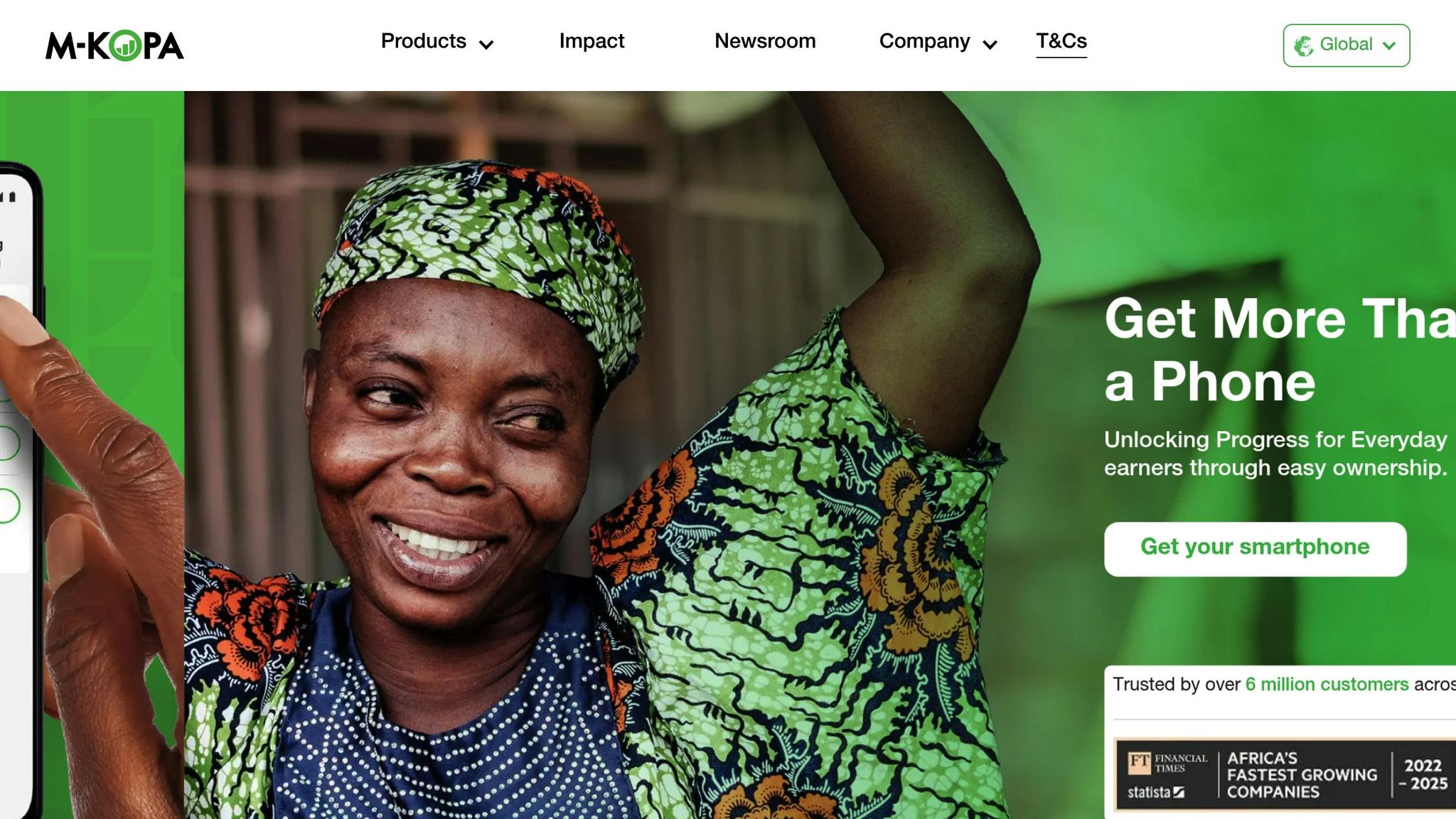
M-Kopa has solidified its position as a major player in Africa’s fintech sector, reshaping financial access with its innovative smartphone financing model. The Kenyan-based company saw remarkable growth in 2025, becoming a key provider of digital financial solutions for underserved communities across the continent.
Growth Milestones That Speak Volumes
M-Kopa’s achievements in 2025 are nothing short of impressive. The company now welcomes a new customer every 9 seconds and processes 15 payments per second. These metrics are driving it toward an estimated $500 million in annual revenue by the end of the year.
Having extended over $1.5 billion in credit to more than 6 million customers across Kenya, Uganda, Nigeria, Ghana, and South Africa, M-Kopa is making a tangible impact. One standout achievement: the company sold over 1 million branded smartphones in the past 12 months, accounting for more than 20% of all smartphones sold in Kenya.
Expanding Across Africa
M-Kopa’s footprint now extends beyond Kenya, with significant growth in Nigeria, Ghana, Uganda, and South Africa. For the first time, the company has gained more customers outside Kenya than within it. This expansion is powered by a direct sales model that reaches even the most remote areas. Such growth positions M-Kopa to further integrate its technology across the continent.
“We are thrilled to make the FT Fastest Growing Companies in Africa list for the 4th year in a row. Our growth continues to accelerate, and we now onboard a new customer to M-KOPA every 9 seconds. Thanks to Africa’s digital payment rails, we now receive 15 payments per second, which in turn creates a unique and deep dataset to understand the financial needs of everyday earners. We are still in the early stages of scaling, with an addressable market that will surpass 1 billion people in Africa by 2040.”
– Jesse Moore, CEO and Co-Founder of M-Kopa
Bridging the Financial Gap with Smart Tools
M-Kopa’s smartphones come equipped with its Smart Money Platform, offering affordable credit, health insurance, and device protection. Using AI-driven credit profiling, the company has connected 1.7 million first-time mobile internet users and enabled 62% of its customers to generate income.
“We are not just selling affordable smartphones: we are selling financial inclusion tools that transform lives.”
– Jesse Moore, CEO of M-Kopa
Supporting Local Manufacturing and Sustainability
In addition to its digital innovations, M-Kopa has invested heavily in local manufacturing and sustainability. Its Nairobi-based assembly plant, launched in 2023, has produced over 1.5 million devices and created 400 jobs, with plans to grow the workforce by 25%. The company’s phone refurbishment program also has a notable environmental impact, saving one tonne of CO₂ for every 13 devices refurbished.
Driving Electric Mobility
M-Kopa’s ambitions extend beyond smartphones. The company has financed over 1,500 electric motorbikes in Kenya, helping riders save 30% on daily costs compared to fuel-powered alternatives.
Looking Ahead
M-Kopa has big plans for the future. By 2027, it aims to produce 10 million smartphones. The company is also expanding its “More than a Phone” initiative, which combines health coverage and digital loans, into new markets.
“The vast majority of adults in sub-Saharan Africa are everyday earners, or people who operate in the informal economy earning a living day-to-day. They are the backbone of the continent’s economies, yet their potential is constrained by a financial system that has largely overlooked them.”
– Nena Sanderson, Chief Product Officer at M-Kopa
M-Kopa’s achievements in 2025 highlight its role as a game-changer in African fintech, blending technological advancement with a deep understanding of local needs to bring financial inclusion to millions across the continent.
18. Showmax (South Africa)
Showmax has solidified its position as a major streaming platform in Africa, boasting 2.8 million subscribers across the continent. Competing with global giants, it has carved out a niche by focusing on strategies tailored to the African market.
Mobile-First Strategy Fuels Usage
Showmax’s mobile-first approach has been a game-changer, driving 75% of its usage across Africa. The introduction of Showmax Pro, featuring live sports, has been particularly successful, with a 20% growth in subscriptions in 2025. Its Premier League mobile plan, which includes Betway Premiership content, has been a big draw for sports enthusiasts.
Local Content: The Heart of Showmax
What sets Showmax apart is its commitment to African storytelling. Nine out of the 10 most-streamed titles since its relaunch have been local productions. This focus on relatable, homegrown content has struck a chord with audiences.
“Local content and offerings in local language continue to resonate strongly across the continent. Nine of the 10 most-streamed titles on Showmax last year were local, because our audiences want to see content that relates to their local cultures.”
– Byron du Plessis, CEO of MultiChoice South Africa
To meet this demand, MultiChoice has ramped up investment in local programming. Showmax plans to increase its African originals by 150%, adding up to 1,300 hours of new content. Upcoming projects include productions from Kenya, Nigeria, and Ghana, further expanding its footprint.
Breaking Barriers with Language Localization
In February 2025, Showmax became the first streaming service to offer a Kiswahili interface, catering to Tanzania and the broader Swahili-speaking population in sub-Saharan Africa. This move reflects the growing appetite for regional language content, particularly in Swahili, Yoruba, and Hausa.
“Adding Kiswahili as a navigation option makes Showmax even more accessible and personal to a large market segment in Africa.”
– Byron du Plessis, CEO of MultiChoice South Africa
Affordable Pricing and Strategic Partnerships
Showmax’s pricing strategy is designed with African markets in mind. Subscription options include Showmax Entertainment Mobile at $3.25 per month and Showmax Entertainment at $7.42 per month in South Africa. In other regions, premium plans range from $5 to $8, making the service accessible to a wide audience.
Partnerships with telecom providers have further reduced barriers, offering affordable data bundles. These collaborations address internet accessibility challenges and help combat piracy, making streaming more viable for cost-conscious consumers.
Expanding Live Streaming and Sports Coverage
Showmax has embraced live streaming to enhance its offerings. In 2025, it made waves by live-streaming Grammy winner Tyla’s sold-out homecoming concert, the first such event streamed by a platform in Africa. Additionally, it announced plans to stream the full broadcast of the 11th Africa Magic Viewers’ Choice Awards (AMVCAs).
Smarter Technology, Better Experience
The platform has invested in AI-driven features to refine user experience. Personalized recommendations and advanced content discovery tools are powered by data analytics, helping Showmax understand and adapt to viewer preferences.
“One of the advantages of streaming is how much data we have on customers’ viewing habits, so we are always listening to our audience and learning and adapting.”
– Tracy-Ann van Rooyen, Showmax’s executive head of content
Industry Recognition Elevates Showmax
Showmax’s efforts have earned it industry accolades, including being named Entertainment App of the Year and Best Television/Streaming Network at The National Film and TV Awards South Africa. These honors highlight the platform’s growing reputation and quality.
While Netflix leads with 6.3 million subscribers in South Africa compared to Showmax’s 3.6 million, Showmax continues to grow by focusing on local content and mobile accessibility.
“We want to reimagine the game by making it effortless to access and afford the stories that our customers love and that people across the continent love.”
– Marc Jury, Showmax CEO
19. TeamApt (Nigeria)
TeamApt has grown from being a fintech service provider into a key player in Africa’s financial landscape, using strategic partnerships and innovative solutions to promote financial inclusion across the continent.
A Stronghold in Nigeria’s Agency Banking
TeamApt leads Nigeria’s agency banking sector, handling an impressive 68 million transactions monthly through its network of 100,000 agents, serving 14 million customers. With a revenue growth rate exceeding 150% CAGR in recent years, the company has built a solid foundation for its ambitious plans to expand further. Leveraging these strong operational metrics, TeamApt has strategically partnered with major players to fuel its growth.
Visa Partnership: A Catalyst for Growth
In January 2025, TeamApt gained a significant boost when Visa invested in its Moniepoint platform, aiming to scale operations and advance financial inclusion across Africa.
“We are thrilled to announce Visa’s investment in Moniepoint. Visa’s backing is a strong endorsement of our vision to digitize and support African businesses at scale. Together, we aim to deepen financial inclusion, enabling SMEs to access the tools and resources they need to thrive in an increasingly digital economy. Given that about 83% of employment across Africa is in the informal economy, we are very keen to widen access and participation in the formal financial system and drive economic growth across Africa.”
– Tosin Eniolorunda, Founder and Group CEO, Moniepoint Inc.
Expanding Across Africa
TeamApt is extending its reach beyond Nigeria, aiming to deliver digital payment and banking services to underserved regions across Africa. In April 2025, the company introduced MonieWorld, a remittance service designed for the UK’s African diaspora. MonieWorld simplifies money transfers to Nigeria, offering instant transactions, competitive exchange rates, and no fees.
“The launch of MonieWorld is an exciting step on our journey to create financial happiness and support Africa’s entrepreneurial potential. It is a natural addition to our existing suite of solutions and will be hugely valuable for customers. It makes it easy, quick and reliable to send remittances.”
– Tosin Eniolorunda
Addressing Nigeria’s Financial Infrastructure Needs
TeamApt’s success lies in addressing the gaps in Nigeria’s financial infrastructure. With only 4.3 bank branches per 100,000 people – far below the global average of 11.7 – digital financial services have become critical.
“We want to be the middle ground between banks and digital approaches to actually serve the next billion Africans.”
– Tosin Eniolorunda, CEO, TeamApt
Industry Recognition
Andrew Torre, Regional President for Central and Eastern Europe, Middle East, and Africa at Visa, emphasized Moniepoint’s impact on African SMEs:
“Moniepoint has built an impressive platform that directly addresses the needs of Africa’s SMEs, a critical segment in enabling economic development. By making financial services and digital payments more accessible and efficient, Moniepoint is helping transform how businesses operate in Nigeria and beyond.”
– Andrew Torre, Visa
TeamApt’s journey from serving Nigerian banks to becoming a leader in Africa’s fintech scene highlights its ability to identify market needs and scale effectively. With Visa’s support and ambitious plans to expand, TeamApt is well-positioned to continue its rapid growth and contribute to Africa’s digital financial transformation in 2025 and beyond.
20. Yobante Express (Senegal)
Yobante Express is reshaping how logistics work across Africa. Since its launch in November 2018, this Senegal-based startup has been bridging informal delivery systems with modern technology, now reaching 21 countries. By combining traditional methods with tech-driven solutions, Yobante Express is creating a new standard for logistics in the region.
Africa’s Largest Cross-Border Delivery Network
With a network of over 3,000 hubs and 2,500 independent carriers, Yobante Express has established itself as a major player in African logistics. The company has offices in nine African nations and has expanded into five European markets, helping African businesses connect with international opportunities. To date, the platform has delivered more than 3 million parcels for over 500 clients. This is a sharp increase from its 2021 numbers, when it handled 1.2 million parcels and achieved a revenue run rate of $8 million.
Tackling Africa’s $160 Billion Logistics Market
Africa’s logistics sector is valued at over $160 billion, but inefficiencies are widespread. Yobante Express addresses these challenges by integrating informal delivery networks with technology that improves tracking and reliability. For example, in Senegal, 25 million parcels move through informal systems annually, compared to just 7 million in the formal sector. By formalizing these networks, Yobante Express is reducing costs and improving delivery efficiency.
Affordable and Fast Deliveries
Yobante Express offers a competitive edge with delivery costs that are 40% lower than traditional players, while also providing next-day delivery services. Its pricing model dynamically adjusts based on factors like route, package weight, and carrier availability. Since 2019, the company has facilitated the movement of nearly $234 million worth of goods across 40 countries.
Expanding Beyond Africa
Under the leadership of CEO Oumar Basse, Yobante Express is scaling its operations globally. The company is making inroads into European markets and is gearing up for a pilot program in Thailand.
“Within six months, we will connect Lagos to Dakar, and within three years, ship parcels from Cape Town to Dakar.” – Oumar Basse, Co-founder and CEO, Yobante Express
Boosting Economic Opportunities
Yobante Express isn’t just about logistics – it’s creating jobs too. The platform allows individuals with access to transportation to become verified Hub/Relay Point Agents or delivery drivers. This gig-economy model not only lowers operational costs but also provides flexible income opportunities in areas where formal jobs are scarce.
Startup Comparison Table
The table below offers a clear snapshot of key metrics and achievements from some of Africa’s most dynamic startups. Covering sectors like fintech, e-commerce, healthtech, digital banking, and insurtech, these companies are tackling diverse challenges across the continent.
Nigeria leads the pack, especially in fintech, with companies like Omniretail boasting an extraordinary 795.9% CAGR and PalmPay achieving 583.6% CAGR. South Africa also stands out, while emerging markets like Zambia and Uganda add to the continent’s growing startup ecosystem. This table captures both the rapid growth and the strategic contributions of these ventures, showcasing their role in shaping Africa’s economic future.
| Startup | Sector | Country | Growth Metric | Market Impact |
|---|---|---|---|---|
| Omniretail | E-commerce & Embedded Finance | Nigeria | 795.9% CAGR | Links manufacturers with informal retailers |
| PalmPay | Fintech / Digital Wallet | Nigeria | 583.6% CAGR | Serves 35 million users with payments, loans, and insurance |
| Remedial Health | Pharma Distribution / HealthTech | Nigeria | 339.1% CAGR | Digitized pharmaceutical supply, growing revenue to $16.3M |
| eShandi | Fintech | Zambia | 276.4% CAGR | Facilitates digital payments and transfers for SMEs and individuals |
| Flutterwave | Fintech | Nigeria | – | Processes payments for over 1 million businesses globally |
| Jumia | E-commerce | Nigeria | – | Africa’s largest e-commerce platform, active in 11 countries |
| OPay | Fintech | Nigeria | – | Offers a full suite of digital financial services |
| Moniepoint | Fintech / Business Banking | Nigeria | 160% CAGR | Revenue surged from $15M to $264.5M |
| TymeBank | Digital Banking | South Africa | 92.3% CAGR | Over 10 million users with no‑fee accounts via retail kiosks |
| Wave | Fintech | Senegal | – | A leader in mobile money for Francophone West Africa |
| Andela | Talent Marketplace | Nigeria/Global | – | Connects African developers with global tech companies |
| VALR | Cryptocurrency Exchange | South Africa | – | Top crypto platform for African retail and institutional traders |
| Ensibuuko Technologies | Fintech | Uganda | – | Banking software serving over 200 financial institutions |
| Pineapple | Insurtech | South Africa | 300%+ growth | AI-driven insurance with instant claims processing |
| InTouch | Communications Tech | Senegal | – | Omnichannel messaging for African businesses |
| M-Kopa | Fintech / Asset Financing | Kenya | 3 million+ customers | Offers pay‑as‑you‑go solar, smartphones, and appliances |
| Showmax | Streaming | South Africa | – | Local content streaming available in over 36 African countries |
| TeamApt | Fintech | Nigeria | – | Provides banking infrastructure and agent network solutions |
Fintech dominates the scene, with eight out of nine African unicorns emerging from this sector. The geographic spread mirrors the broader startup landscape, with South Africa hosting 51 and Nigeria 28 of Africa’s 130 fastest-growing companies.
Growth patterns vary widely. B2B-focused companies like Moniepoint and TeamApt show steady revenue growth, while consumer-facing platforms like PalmPay and TymeBank report rapid user acquisition. Startups addressing essential needs – whether in finance, healthcare, or digital services – tend to achieve remarkable growth rates.
“It has been tracking companies across sectors that have managed to grow against the odds, often in markets long overlooked by mainstream capital.” – Ted Muthomi, Medium
These startups are not just growing – they’re reshaping Africa’s economic and digital landscape. They’re creating jobs, improving access to financial services, and building critical infrastructure. From Remedial Health’s overhaul of pharmaceutical supply chains to the game-changing fintech and e-commerce solutions, these companies are driving meaningful progress across the continent.
Conclusion
Africa’s startup ecosystem is undergoing a transformation that goes beyond impressive growth figures. The 20 companies highlighted here represent a shift in how the continent approaches business, technology, and economic development. In 2021, mobile technologies and services accounted for 8% of GDP in sub-Saharan Africa, and these startups are building the digital backbone that will drive the continent’s future economy.
This transformation is impacting daily life in significant ways. By 2021, 55% of Africans had access to a bank account, either through a financial institution or a mobile money service provider. Sub-Saharan Africa, in particular, stood out, with mobile money account holders exceeding the global average by more than three times. Companies like PalmPay and TymeBank are at the forefront of this financial inclusion movement.
What sets these startups apart is their ability to create solutions tailored to local needs, rather than replicating Western models. Take M-KOPA, for instance – their pay-as-you-go solar energy system allows households to access renewable energy without the burden of upfront costs. Similarly, other companies are using digital tools to improve healthcare access. This localized approach is proving effective: startups employing disruptive technologies in Africa have a 4.5 percentage point higher probability of success compared to those that do not.
The numbers tell a compelling story. By 2025, Africa’s startup ecosystem is projected to contribute over $100 billion to the continent’s economy. In January 2025 alone, African startups raised $289 million in funding – a 240% increase compared to the previous year. Venture capital investments surpassed $2 billion in 2024, signaling growing international confidence in Africa’s potential.
“With 60% of the continent’s population under 25, this youthful demographic is fueling innovation, particularly in fintech, where mobile money services now boast over 800 million registered accounts, creating an ecosystem where Africa’s future economy will increasingly be powered by local enterprises dealing with local needs at scale.” – Katlego Maphai, CEO of Yoco
This demographic advantage is significant. By 2030, 42% of the world’s youth will live in Africa, and by 2050, one in four people globally will be African. This young, tech-savvy population isn’t just a massive market; it’s also the driving force behind the continent’s innovation.
For investors, the opportunities are clear but require a nuanced approach. Approximately 80% of African startups’ funding comes from international sources, highlighting strong global interest. However, understanding local market dynamics, regulatory environments, and cultural factors is essential. Investors should focus on scalability from the outset and actively build relationships with global networks.
Entrepreneurs, too, should consider the sectors showing the most promise. Fintech remains dominant – eight of Africa’s nine unicorns are fintech companies – but there are also exciting opportunities in agriculture, healthcare, e-commerce, and renewable energy. The key is to address real challenges with technology that leapfrogs traditional infrastructure.
“What’s interesting about foreign investment is that top [African] talent tends to go to places like Silicon Valley or Europe – but when they return after cutting their teeth abroad, they bring back credibility, networks, and local expertise. That’s how I think more capital will start to flow in.” – Mathieu Coquillon, co-founder and Director of Mama Money
Companies like Flutterwave, Andela, and M-KOPA are paving the way for Africa’s digital economy. From enabling cross-border transactions to connecting African developers with global opportunities, these startups are creating jobs, expanding access to essential services, and positioning Africa as a major player in the global tech landscape.
This is the moment to engage with Africa’s startup ecosystem. Whether you’re an investor seeking high-growth opportunities or an entrepreneur aiming to tackle meaningful challenges, these 20 companies are proof of what can happen when innovation meets opportunity on the world’s youngest and fastest-growing continent.
FAQs
What is driving the rapid growth of fintech startups in Africa, and how are they transforming the economy?
The rapid rise of fintech startups in Africa can be traced back to a few major factors. For starters, over 60% of adults in sub-Saharan Africa still don’t have access to traditional banking services, creating a huge need for more accessible financial options. Add to that the widespread use of mobile phones, which has paved the way for digital financial services to flourish. On top of this, gaps in the traditional banking system have left plenty of room for fintech companies to step in and offer innovative solutions. Supportive regulations, strategic partnerships, and a growing shift toward digital tools have only added fuel to the fire.
This boom is reshaping Africa’s economy in a big way. It’s not just about giving millions of people access to banking, credit, and payment services – they’re also seeing real economic growth. With fintech revenues projected to hit $230 billion by 2025, the sector is creating jobs and encouraging entrepreneurship throughout the continent.
How are startups like M-KOPA and Remedial Health using technology to solve challenges and improve access to essential services in Africa?
Startups like M-KOPA are reshaping financial inclusion and healthcare access across Africa through mobile technology. By offering affordable services like small loans and health coverage, they’re making essential resources more reachable for underserved communities.
In the same vein, Remedial Health is enhancing healthcare delivery with digital tools such as inventory management software and financing options. These innovations help small healthcare providers streamline their operations and improve access to quality care. Both companies are tapping into technology to tackle pressing local issues and drive positive change within their communities.
How do international investments contribute to the growth of African startups, and what steps can investors take to succeed in this ecosystem?
International investments play a crucial role in driving growth for African startups. They provide the funding needed to spark innovation, expand operations, and tap into new markets. By 2025, these investments have seen impressive growth, signaling global confidence in Africa’s vibrant startup landscape, particularly in sectors like fintech, healthcare, and renewable energy.
For investors looking to make an impact, success lies in conducting in-depth market research, forming strong local partnerships, and adopting long-term strategies tailored to the specific needs of African startups. Building trust with local entrepreneurs and understanding the region’s cultural dynamics are equally important for creating investments that are both meaningful and sustainable.




